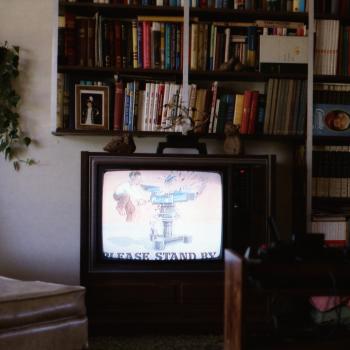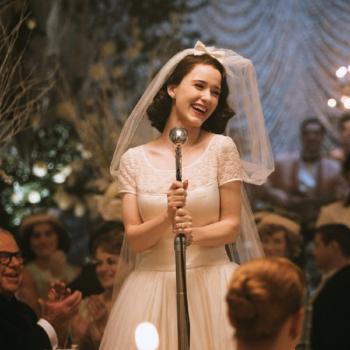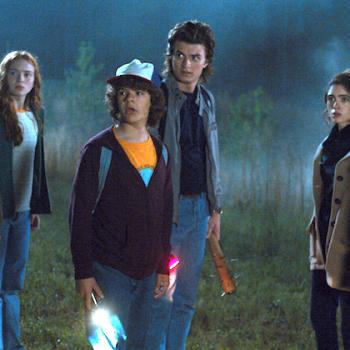 Recently a friend put me in touch with Christian author, W. David O. Taylor (editor of a book of essays titled For the Beauty of the Church: Casting a Vision for the Arts), who is writing an article about a two-pronged question pertaining to my profession: Why is there such an overall dearth of healthy onscreen marriages in television and film? And where might we find some exceptions?
Recently a friend put me in touch with Christian author, W. David O. Taylor (editor of a book of essays titled For the Beauty of the Church: Casting a Vision for the Arts), who is writing an article about a two-pronged question pertaining to my profession: Why is there such an overall dearth of healthy onscreen marriages in television and film? And where might we find some exceptions?
Taylor was hoping to reach someone in the industry who might have some insight. Truth be told, though, despite the fact that I’m Christian, a screenwriter, and married, to boot, I often feel as vexed by the question as he does.
Thus what better place to ponder it than here at “Good Letters,” whose incisive readership might shed light upon the matter thanks to the comments box below.
With Taylor’s permission, I share his query in full:
Do you know of any Christians who are writing for TV or film, who happen to have written storylines about marriage, specifically about traditional sorts of marriages, in the “Friday Night Lights” or “Before Midnight” or even “The Incredibles” and “Downtown Abbey” vein?
I’m writing an article for Christianity Today and, while I have plenty of data on how traditional marriages are faring poorly on the small or large screen (by absentia or massive dysfunction, as Jeanine Basinger chronicles in her book), I have no idea whether there might be Christian writers out and about, attempting to produce good stories about husbands and wives in honest, compelling ways.
Are there non-Christian writers performing this task (per the above examples)?
Is there any reason why the complexities and tensions as well as pleasures and inherent “goods” of traditional marriage no longer capture the imaginations of producers and writers? Is it a dramatically uninteresting subject matter? Is the fact that over 50% of today’s marriages end in divorce a reason why writers cannot imagine it any other way? Is it a matter of a “trend”?
Any clue what might be happening behind closed (studio) doors? Any good writers, unbeknownst to the rest of us, generating compelling stories about traditional marriages?
For starters, to answer the questions that bookend his query, there’s a great divide between what is being written and what is being produced. Let me put this in perspective apropos television, and specifically the broadcast networks (as opposed to cable) since they function so cyclically.
Every summer a network such as NBC will hear roughly 500 pitches from writers for drama and comedy series. Yes, 500. Summer after summer. Keep in mind there are four other broadcast networks in play (ABC, CBS, Fox, The CW). Granted, two or more of them will often hear the same pitches; still, we’re easily talking over a thousand new ideas for broadcast television on a yearly basis. Add to that cable channels that have redefined television in the past decade—HBO, Showtime, AMC and FX leading the charge—and the pitch-to-product ratio tips more drastically.
Out of 500 pitches, NBC may buy, roughly, seventy pilot scripts—around twenty of which will produce pilot episodes.
At the end of the day, a mere handful will get a series order and make it on air.
Five hundred ideas winnowed down to five new series. That’s a .01% chance of success. (Staying on air once you get there is another feat altogether.)
So there’s a numerical factor that must frame any proper answer to Taylor’s question. With such numbers in mind, he can be assured that, yes, “good writers, unbeknownst to the rest of us, [are] generating compelling stories about traditional marriages.” Out of the 490 pluse ideas at NBC that never see prime time any given year, surely there are two or ten or twenty that present a far more nuanced picture of marriage than current content provides.
How many of these writers are Christians, I simply don’t know. I’m not part of any Christian community in the industry, one reason being that I live in New York City, whereas most of the industry is based in L.A.
Someone who founded such a community is Barbara Nicolosi of Act One, a consulting and training program for Christian screenwriters and producers in Hollywood. Taylor would be familiar with Nicolosi by her piece in For the Beauty of the Church, and she would certainly have a more inside sense than I do of just how many Christian screenwriters are “out and about” in the effort Taylor describes.
Nicolosi summed up her reasons for founding Act One with a swift kick in the pants to her fellow Christians in the business: “I realized coming here that it’s not that Hollywood was persecuting the Church as much as it was the Church was committing suicide in Hollywood. Big difference.… Hollywood wasn’t anti-Christian as much as it’s anti-bad art, and we’re just giving it schlock.”
I’m in full agreement with Nicolosi that Christians stop feeling crucified by the powers–that-be of secularity and pony up with art more excellent than earnest. Her charge of schlock undoubtedly plays no small role in the truths Taylor would uncover.
But her claim as to what Hollywood is and is not against falls a bit short: one would be hard-pressed to prove that the industry does not have at least a certain allergy to Christian subject matter, and all you have to do to disprove its being “anti-bad art” is do some channel-surfing or take a trip to the nearest multiplex.
More to the point is what Hollywood is for, which is money. And this brings us to the heart of Taylor’s question: Why is the seeming preponderance of unhealthy onscreen marriages such a safe bet, literally and figuratively speaking?
Tomorrow I’ll chip away at that question further, and reflect upon the picture of marriage in certain shows that I have watched and/or worked on myself.
Please feel encouraged to comment below and pass this along to others who might weigh in; Taylor welcomes your input as much as I do.
Bradford Winters is a screenwriter/producer in television whose work has included such series as Oz, Kings, Boss, and The Americans. His poems have appeared in Sewanee Theological Review, Spoon River Poetry Review, and Georgetown Review, among other journals. He lives in Brooklyn with his wife and three children.











